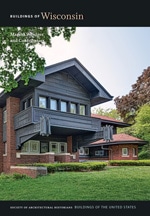
If Richland Center was the birthplace of Wisconsin’s women’s suffrage movement, then Julia Busby Bowen was its midwife. A native of New York, Bowen headed the Richland Center Woman’s Club from 1882 through the early 1890s. The organization’s stated purpose was to promote domestic and civic well-being, but its main, unstated purpose was to promote women’s suffrage. The group also worked to broaden the definition of “woman’s sphere” to include education, women’s prison reform, farmer’s markets, libraries, and temperance.
Bowen’s house reflects her privileged position. When built, it was a two-story Italianate brick building with a low-pitched hipped roof, with the usual brackets and a bay window off the north parlor. During the 1880s, the Bowens added a one-and-a-half-story kitchen wing to the east, designed in Second Empire style with a steeply pitched mansard roof punctuated by gabled dormers. In 1906, after Julia Bowen’s death the previous year, her son-in-law, Grant Ross, added a grand porch across the front, as classicism came into vogue. Ionic columns support this two-story porch, which is balustraded along the second tier.

